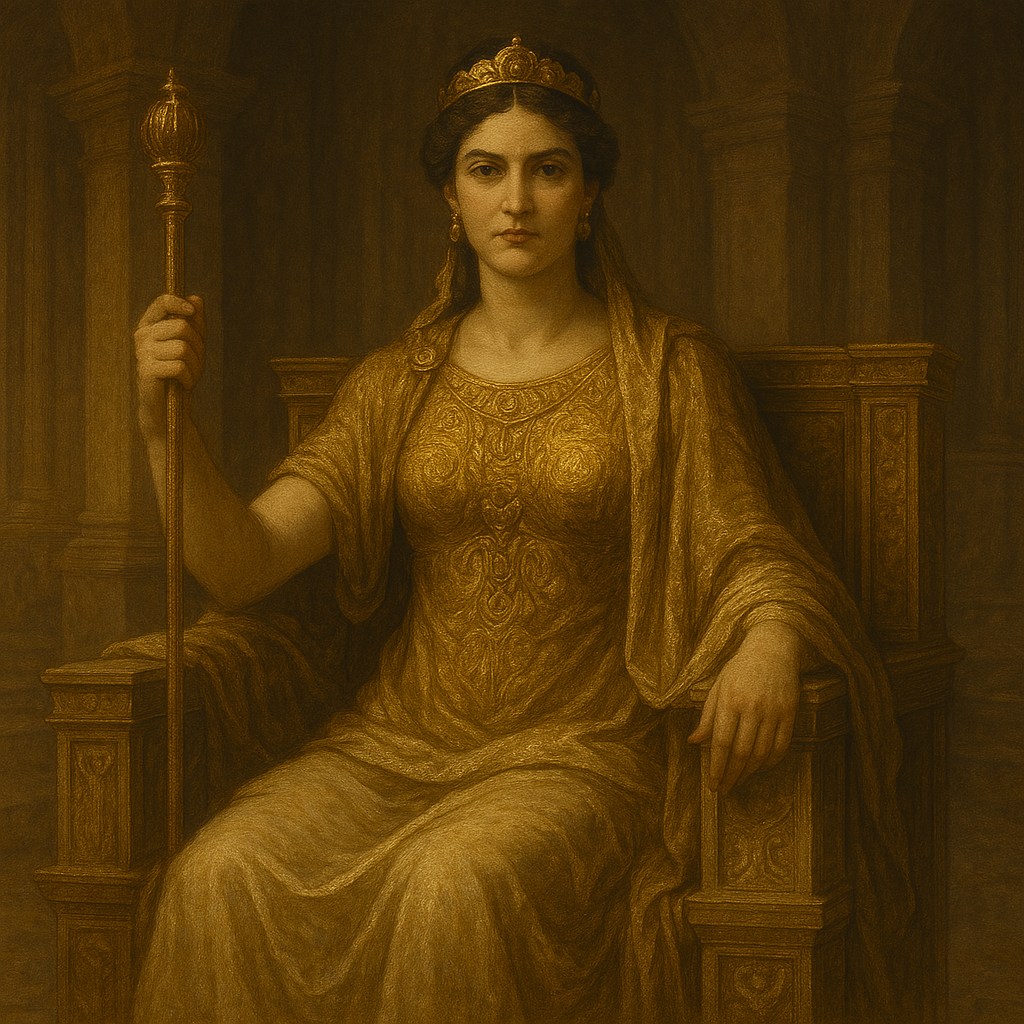Overview
Hera is the ancient Greek goddess of marriage, queenship, family, and divine order. As the queen of the Olympian gods, wife and sister of Zeus, Hera holds immense authority and dignity. She represents the power of commitment, loyalty, and sacred union, while also embodying the complexities of devotion, jealousy, and feminine sovereignty. Hera’s Roman counterpart is Juno, who carried many of the same regal and protective attributes.
Though often portrayed in myths as a jealous wife, Hera is also a guardian of the social order and protector of women, especially in the roles of wife, mother, and matron. Her influence spans the domestic and political realms, serving as both celestial queen and earthly archetype.
Origins and Mythological Role
Hera is one of the original Olympian deities, daughter of Cronus and Rhea, and the sister of Zeus, Poseidon, Hades, Demeter, and Hestia. She was swallowed by Cronus at birth and later rescued by Zeus during the Titanomachy.
She became Zeus’s consort and queen, ruling alongside him over gods and mortals. While her marriage is often turbulent in myth, Hera’s position as divine queen is never diminished—she retains her status as the embodiment of regal feminine power.
Symbols and Iconography
Hera is portrayed as a majestic, mature woman of regal bearing, adorned with a crown or diadem and seated upon a throne.
Common Symbols
- Peacock – Her sacred bird, symbolizing beauty, pride, and divine watchfulness
- Crown or Diadem – Signifying her queenship and sovereignty
- Pomegranate – Emblem of fertility, unity, and the sacred bond of marriage
- Lotus-Tipped Scepter – Denoting rulership and divine authority
- Cuckoo – Sometimes associated with her courtship myth with Zeus
- Cow – Representing nurturance and maternal guardianship
She is often shown:
- In flowing robes, seated beside Zeus or standing tall with a commanding presence
- Accompanied by her animals or symbols of authority
- In scenes of marriage, rulership, or judgment
Attributes and Powers
1. Goddess of Marriage and Sacred Union
Hera is the divine protector of marriage vows and conjugal harmony. She oversees weddings, fidelity, and the rites of matrimony, ensuring the sanctity and structure of family life.
2. Queen of the Gods
As the supreme female deity of Olympus, Hera is equal in status to Zeus in governance. She is called upon in matters of law, politics, and ceremonial hierarchy, embodying divine justice and matriarchal strength.
3. Patroness of Women and Childbirth
Though not a fertility goddess in the traditional sense, Hera watches over women in all stages of life—especially as wives, mothers, and protectors of legacy. She was invoked for safe childbirth and the health of families.
4. Fierce Defender of Her Role and Dignity
Hera is known for her jealousy and wrath, particularly in response to Zeus’s many infidelities. While this may cast her in a negative light, it also underscores her unyielding defense of her role, honor, and power.
Key Myths and Stories
The Courtship and Marriage of Hera and Zeus
Zeus courted Hera persistently, eventually disguising himself as a cuckoo and winning her compassion. Their union was celebrated as a sacred marriage, and Hera became the queen of Olympus. Their mythic wedding was seen as the prototype of divine and earthly unions.
Hera and the Trials of Heracles
One of Hera’s most famous mythic roles is as the antagonist of Heracles (Hercules), a child born from Zeus’s affair with a mortal. Hera sends snakes to kill him as a baby, and later causes many of the trials he must endure. Despite her cruelty, these trials ultimately forge Heracles into a hero, demonstrating Hera’s role as a harsh but transformative force.
The Judgment of Paris
When the mortal Paris is asked to judge the fairest goddess between Hera, Athena, and Aphrodite, he chooses Aphrodite. Hera, offering power and rulership, is rejected, and her resentment contributes to the unfolding of the Trojan War. This story highlights her pride, power, and strategic influence in divine affairs.
Temples and Worship
Major Cult Centers
- Argos – One of her oldest and most important cult centers, with grand temples and annual festivals
- Samos – Home to the Heraion, an enormous sanctuary and place of pilgrimage
- Olympia – Where she was worshipped alongside Zeus and featured prominently in early games and rituals
Rituals and Festivals
- Heraia – Athletic and religious festivals held in her honor, including races for young women
- Marriage Ceremonies – Couples invoked Hera’s blessing for protection, loyalty, and fruitfulness
- Offerings – Often included peacock feathers, pomegranates, and finely woven garments
Hera’s worship emphasized stability, harmony, and sacred governance, and her temples were often among the oldest and grandest.
Spiritual and Archetypal Significance
In modern metaphysical and archetypal frameworks, Hera represents:
- The Sovereign Feminine – Dignity, rulership, and leadership from the heart
- The Wife and Matron Archetype – Devotion, protection, and fierce loyalty to one’s values
- The Defender of Sacred Union – Upholding commitments and honoring what is holy in partnership
- Shadow Themes of Jealousy and Control – Offering insight into the complexity of relationships, power dynamics, and emotional expression
She is a powerful ally for:
- Strengthening personal boundaries and self-respect
- Blessing marriages or sacred partnerships
- Leadership with grace and integrity
- Working through trust, betrayal, and emotional sovereignty
Conclusion
Hera stands as a towering figure of divine authority, sacred union, and feminine power. She teaches the importance of honoring one’s role, protecting what is sacred, and embracing the full spectrum of emotion—both nurturing and fierce. As Queen of the Gods, she reminds us that true sovereignty lies in standing firm in one’s dignity, committing to truth, and leading with unwavering grace. Whether invoked as protector of family, enforcer of justice, or matron of sacred vows, Hera remains an enduring symbol of sacred queenship and the strength of the feminine divine.

